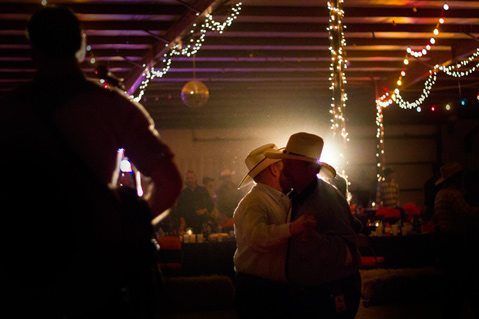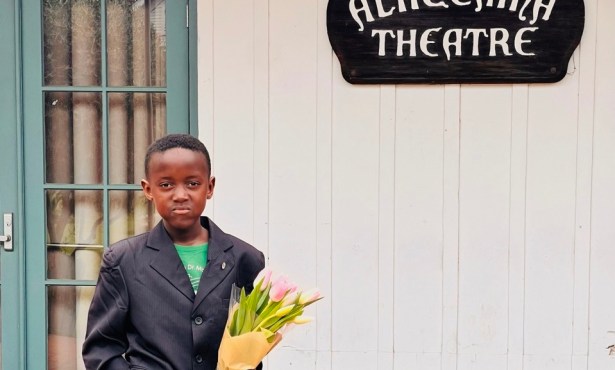Queens and Cowboys: A Straight Year on the Gay Rodeo
Director Matt Livadary

This engrossing film looks at the little known world of the International Gay Rodeo Association, which was conceived 30 years ago. It’s a parallel universe to traditional “straight” rodeo where competitors are just as talented, determined, and committed but also allowed to be open about their sexual orientation. Queens busts the stereotype of the American cowboy, establishing that it’s a way of life rather than a lifestyle.
What difficulties did you encounter while making this film?
Where do I start? Many lessons were learned on this film and almost all of them the hard way. The hardest thing was definitely editing. The rodeos are so fun and so absolutely film-able that I would come home from rodeo weekends with more interviews and footage than I knew what to do with. In all, there’s about 800 hours of footage, which I can’t really believe. And for the most part I had to transcribe it into a binder first in order to even begin wrapping my head around it all. And on top of it, you have the literally hundreds of intimate interviews where real people are trusting you with their stories and praying that you represent their lives. The pressure mounted.
My producer Erin and I outlined and re-outlined constantly, falling in love with stories and moments that seemed to be these puzzle pieces that I stubbornly tried to force into the edit. And for a long time nothing worked. We had great characters, but as a whole it just felt wrong. Then maybe a year and a half into the edit, we had a breakthrough with one simple theme that unlocked everything. I won’t give it away here, but it was so painfully simple and seemingly obvious but once we discovered it, the movie roared to life and we had a rough cut within a few weeks.
Having never gone through this on such a large scale before, it was as traumatizing as it was a life-changing discovery process — one that I’m looking forward to on future stories. Because in hindsight, every single hour spent struggling to find the exact tone and story was exactly the process the film needed to discover itself and without each one I probably wouldn’t be as proud as I am of the way Queens & Cowboys turned out.
Did you receive any flak from straight people about making the film?
Before I’d leave for rodeo weekends with drag queens and cowboys alike, my guy friends would always joke, “Check under the hood before you take her for a spin.” And while it was all in jest, I really do think most straight people were expecting this to be some kind of personal discovery story for me and my sexuality.
So early on, when I’d sit next to people on the plane making small talk, “Oh you know, I’m filming a documentary on gay rodeo….,” they’d blink for a beat trying to size me up and so I’d always be quick to qualify with “…and I’m straight.” I never said it pejoratively. I just found it interesting that straight people seemed to open up more to me when I added that.
But after a while filming the rodeo and growing more comfortable with myself, I’d be on the plane and I’d simply say, “I’m filming a documentary on gay rodeo.” And when I didn’t offer anything more, the uncertain person beside me would wait and finally say something like, “Huh… you know, my brother-in-law’s aunt is gay….” I don’t know why, but I found it really amusing and telling to find where people would take the conversation.
What was your favorite experience of the project?
My favorite experience has been the incredible support I’ve received throughout its journey. This film was made for very little budget, so it was only made possible by favors and work from so many people. From sleeping on the couches of rodeo competitors to save money, to our successful Kickstarter campaign to my parents letting me move back home during making this to my friend, collaborator, and mentor Ben Blank letting me work at his edit bay for two years to all my friends pitching in to watch cuts and give me notes and help in any way they could. There are too many to list here. But standing at the finish line and looking back on every serendipitous moment where people came together and helped the film happen in such a critical way is humbling.
What do you hope people take away from this film?
We spent a lot of time trying to cover everything in this film, from the Stonewall riots to Brokeback Mountain to the history of the cowboy. After a while we realized that this film shouldn’t try to be a catch-all for gay and Western history.
We hope to begin to reset the idea of tradition that has excluded so many people who have always been a part of it, simply not a part of its discussion. Simply by showing up to the film, the audience is already starting of a new wave of accepting the idea of a larger spectrum. The film touches on many themes but only starts a conversation — one that I hope audiences will continue well after they’ve left the theater. Less about the differences between our sexuality but more so the unifying qualities of perseverance and courage.
Check the latest schedule here.



